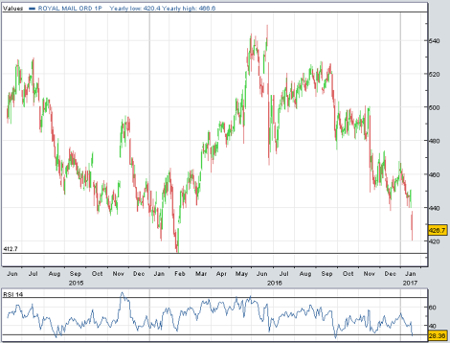Royal Mail shares dumped to 11-month low
19th January 2017 12:18
by Harriet Mann from interactive investor
life as a blue-chip share has been a rollercoaster. Joining the market in 2013 in a hugely oversubscribed placing, the high-yielding shares have yo-yoed since. Slumping 5% Thursday following nine-month results, they are fast approaching two-year lows, under pressure from Brexit, fierce competition, an ongoing decline in letter-writing and its burdensome pension scheme.
Over 138 million parcels were delivered during December and the key Christmas period. Group revenue was flat, as expected, as the weak pound added around £20 million to UK Parcels, International & Letters (UKPIL) - from import revenue - and as terminal dues (costs) linked to exports increased by £30 million.
Sales from the flagship UKPIL business fell 2% during the nine months. Despite the competitive backdrop, parcel volumes rose 2% and revenue 3%, although this was offset by a further 5% plunge in turnover from letters, as it struggles to counteract low pricing and the impact of economic uncertainty on advertising and business mail.

One of the largest ground-based parcel delivery providers in Europe, momentum in Royal Mail's GLS division continued, with volumes up 8% and revenue 9%. All its key markets are expanding, save Ireland, but management also has the timing of Easter and other public holidays to thank, adding around 1% to both volume and revenue. The recent acquisitions of Spanish ASM and Californian GSO are also going to plan.
"The results do little to appease concerns about both the long-term decline in UK letter volumes, something worsening via Brexit-inspired business uncertainty, and tough competition within parcels," notes Mike van Dulken, head of research at Accendo Markets.
An annual budget of £500 million has been earmarked for investment over the next two yearsThese results are in line with City expectations, so the big worry is around plans to close its hugely expensive final-salary pension scheme. With the current annual cost of £400 million expected to swell to over £1 billion in just a few years, management want to shut the plan by April 2018. The idea is to move all current members to a Defined Contribution scheme and give them a one-off payment of £750.
The consultation ends in March, but with furious workers threatening strikes, plans are expected to change.
With revenue struggling, management focus has turned to margin growth through savings. Increasing its three-year cost-cutting target to £600 million from £500 million back in November, Royal Mail is still on track to avoid £225 million of operating costs from the UKPIL business in 2016/17, bringing operating costs down 1% before transformation costs of £130-£160 million.
An annual budget of £500 million has been earmarked for investment over the next two years, which will be focused on expanding the successful GLS business.
Down 23% since the summer, the shares are nearly back where they were this time last yearTracking London's blue-chip index, Royal Mail shares unravelled from their 2015 highs, bottoming out at around 410p in February 2016, a level they hadn't seen since early 2015. They did rebound by a third to two-year highs in June, but it's been downhill since the EU referendum, with interim results and pension plan consultation dumping the shares to 420p on Thursday.
Down 23% since the summer, Royal Mail shares are nearly back to where they were this time last year. Pension issues have put the share sunder a cloud and, until we hear more from the consultation process, they're likely to struggle.
Nearer their 330p IPO price than the 618p hit shortly after, the City is happy to hold fire on any immediate decision making, with a 'neutral' consensus rating. A dividend yield of over 5% may tempt some, however.
With the financial year ending on 26 March, investors will have to wait until May for the full performance breakdown.
This article is for information and discussion purposes only and does not form a recommendation to invest or otherwise. The value of an investment may fall. The investments referred to in this article may not be suitable for all investors, and if in doubt, an investor should seek advice from a qualified investment adviser.